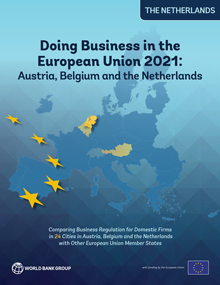Overview
Doing Business in the European Union 2021: Austria, Belgium and the Netherlands assesses the regulatory environment for businesses and its impact on local entrepreneurs in 7 cities in Austria (Bregenz, Graz, Innsbruck, Klagenfurt, Linz, Salzburg and Vienna), 7 cities in Belgium (Antwerp, Bruges, Brussels, Charleroi, Ghent, Liège and Namur) and 10 cities in the Netherlands (Amsterdam, Arnhem, Eindhoven, Enschede, Groningen, The Hague, Maastricht, Middelburg, Rotterdam and Utrecht). The study measures regulations relevant to five stages in the life of a small to medium-size domestic firm: starting a business, dealing with construction permits, getting electricity, registering property, and enforcing contracts. In each of these areas, the study highlights good practices that can be leveraged to empower local entrepreneurs and firms.
Doing Business in the European Union is a series of subnational studies requested and funded by the European Commission, Directorate-General for Regional and Urban Policy, and produced by the World Bank Group. Previous editions, covering cities from Bulgaria, Croatia, the Czech Republic, Greece, Hungary, Ireland, Italy, Portugal, Romania, and Slovakia, were released in 2017-2019.
Where is it easier to do business in Netherlands?
Main Findings
- No single city does equally well on all five indicators. Eindhoven and Middelburg place consistently in the top five across indicator areas. Maastricht leads in getting electricity, Middelburg in dealing with construction permits, and Eindhoven in enforcing contracts. Five cities rank among the top half in at least two indicators and among the bottom half in at least two others, suggesting that they have something to teach and something to learn from their neighbors.
- Subnational score variations are most significant in the ease of dealing with construction permits, enforcing contracts, and getting electricity. These disparities can help policy makers identify which cities have good practices that other cities can adopt and improve without major legislative overhaul. Cities perform homogeneously in starting a business and registering property.
- The regulatory framework for the five areas is set at the national level and applies across all Dutch cities. All locations score the same on quality components of the Doing Business indicators. They obtain the highest score globally for the quality of the centralized land administration framework (registering property).
- Replicating local good practices can boost the Netherlands’ competitiveness, especially in dealing with construction permits and enforcing contracts. In starting a business, getting electricity, and registering property, the country can also look elsewhere in the European Union and globally to improve its business regulation.
- Time is the main source of variation among the performances of the Dutch cities benchmarked. Firms in Utrecht spend more productive hours complying with regulatory requirements than elsewhere in the country—four months more than their peers in Eindhoven.
Note: Data for Amsterdam, as well as for comparator economies and regional averages, are not considered official until published in the Doing Business 2021 report.

